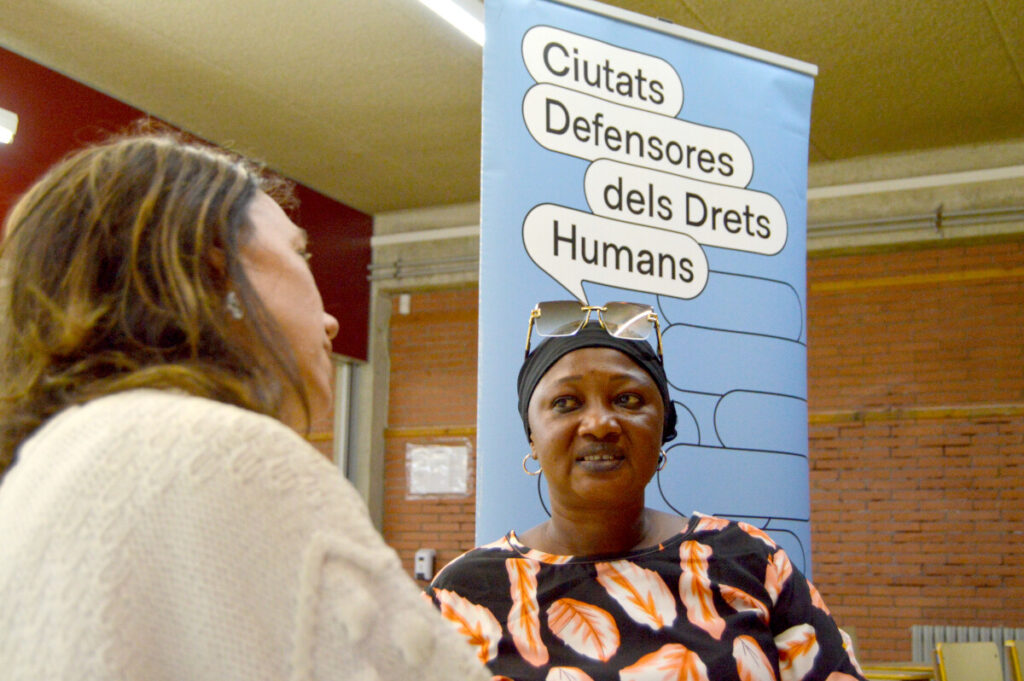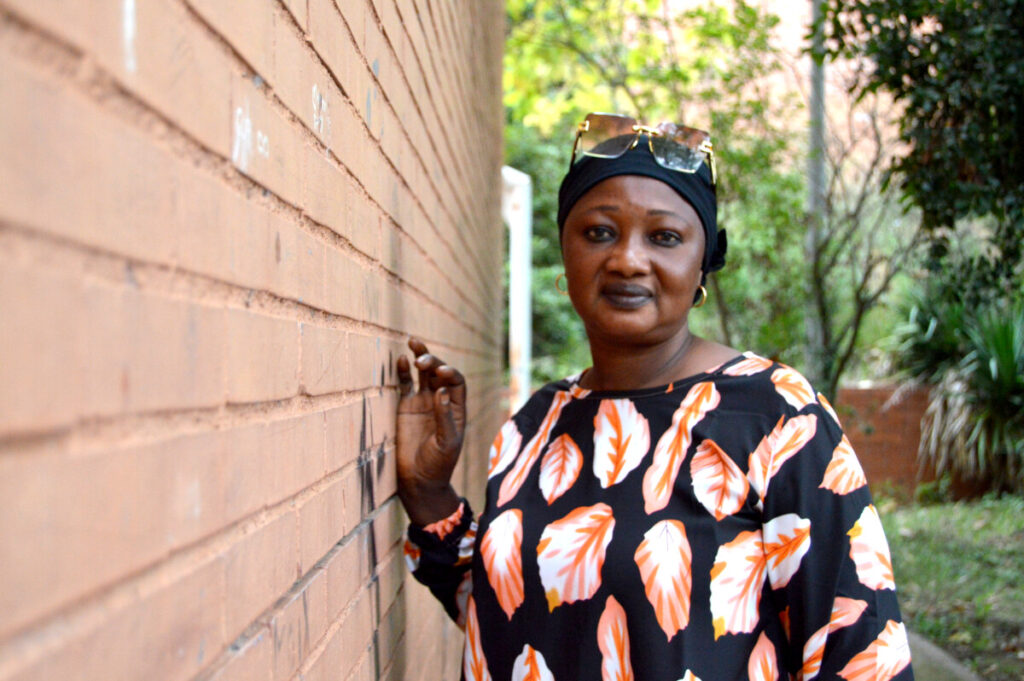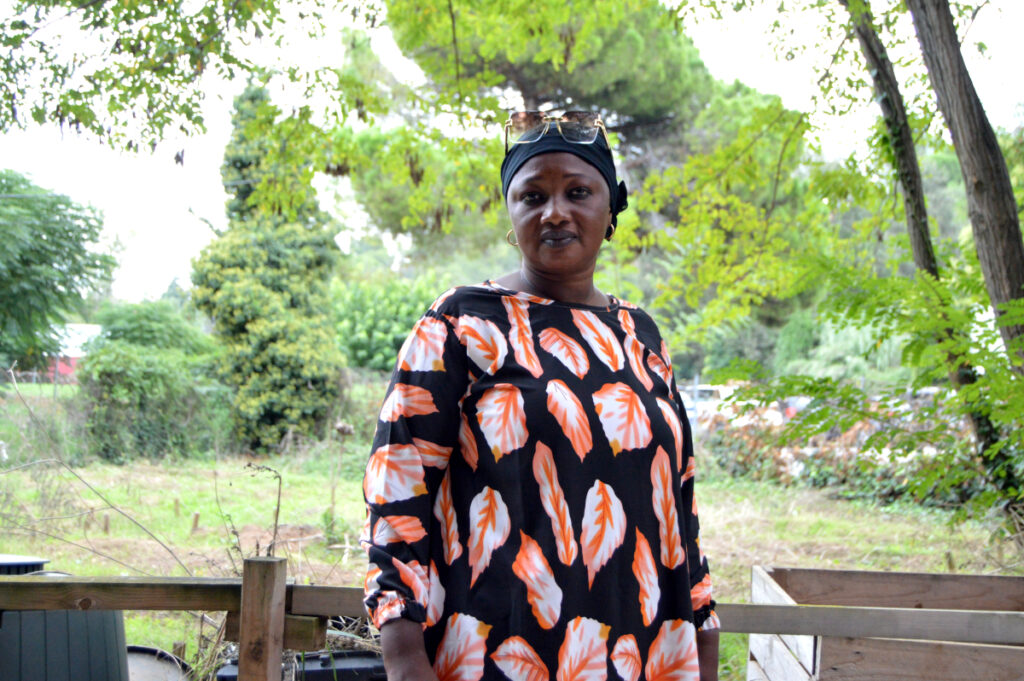The Gambian activist is one of the visible faces of Wassu Kafo, an NGO that fights against genital mutilation and child marriage.
Female genital mutilation is very present in Gambia and in many of the surrounding countries. Generating social and political awareness to eradicate this practice is one of the purposes of Fatou Nyang, a woman who went from cutting her daughter’s genitals, when she was unaware of the medical effects of this practice, to becoming involved in the NGO Wassu Kafo Gambia, which works to combat it.
Did your daughter’s genital mutilation raise your awareness?
No, I became aware later, when I joined Wassu Kafo. I started working as a cleaner and asked what they did. They explained to me how they fought against female genital mutilation and then I became aware that I had suffered it myself and I realized that I had to defend myself, my family and the women. Because yes, I took my daughter to have it done but at that time I was not yet working in Wassu Kafo and I did not know what was behind the practice. I did not know that it could lead to complications and health problems and that is why I participated in the ceremonies around female genital mutilation.
“We collect data on all the complications and health problems involved in female circumcision.”
The NGO is dedicated to research. It collects data on all the complications and health problems involved in female circumcision. That’s how I was able to get informed. They don’t speak from opinion, but based on data, on research. In other words, when we talk to people, we tell the truth. That is how I became a trainer.
You were able to apologize to your daughter, what was it like?
Every day, when I came home from work, I explained to her little by little what ablation was and the complications that could arise from it. When I had given her a lot of information, I apologized, but I also told her that when I took her to have it done, I didn’t know it wasn’t right. I had to tell her the truth. There are always more problems if you don’t tell the truth.
There are several types of female genital mutilation, which one is most common in Gambia?
The first consists of cutting the upper part. The second, the top and the sides. The third, the top, the sides and seal. It is not clear to me which is the most common, it depends on the traditions. However, I think the third type is very common, although it is not talked about too much. It is intended that the girl should not sleep with men who will not be her husband, because this is a sin for the whole family. With sealing, menstruation accumulates because there is a very small hole left. The periods become very painful.
“With the sealing, menstruation accumulates because there is a very small hole left. Periods become very painful.”
In Gambia, the presence of women in politics and even as social leaders is limited.
Now there are beginning to be women politicians, even deputies. This is thanks to education.
Does the increased presence of women in politics help in the fight against female genital mutilation and other women’s rights?
Yes, they support us. And so do some male deputies. We are very proud of the deputies who support us, they do very good work.
Is it because of the fall of the dictatorship in 2016 or does the change come from before?
The ban on female genital mutilation was in 2015.

Now there is a moment of democratic opening. How do you explain that the law prohibiting female genital mutilation was from the dictatorship?
Religious leaders say that Islam prescribes that it must be so. Now, these leaders have a lot of influence on democracy. They say if you oppose the practice, you are an enemy of Islam. We prayed that the law would not be repealed, but it was repealed a year and a half ago because female genital mutilation was still being practiced illegally, posing more health hazards.
“Some Muslim leaders say that if you oppose female genital mutilation, you are an enemy of Islam.”
Are there Muslim groups or leaders who support you?
Yes, there is a well-known imam in the country who supports us. It was not easy, because initially he did not want to listen to me, but I approached him with a lot of respect. When he wanted to listen to me, he told me that we had his support. Not all religious leaders are in favour of female genital mutilation. Some are with us.
Do you notice a difference between the cities and the rural world?
It depends on the tribe. The Wolofs don’t usually do it and are in the majority in the cities. In the rural areas, there are more jolas and mandenkás, who do.
Wassu Kafo has been instrumental in promoting the National Training Program for Health Professionals.
Training is very important. We train doctors, nurses, also in health centres… because all of them have seen the complications derived from ablation but did not relate it. We go to universities and even to practitioners of female genital mutilation to give them evidence; to let them know the effects of the practice.
“With genital mutilation you can have fistulas, urinary incontinence and complications during pregnancy and childbirth.”
The operation itself is already a risk, but what other, not so obvious, effects do female genital mutilation have?
You can have fistulas, urinary incontinence and complications during pregnancy and childbirth. Many women bleed to death.
The Cuban medical brigade plays a very important role in implementing the national program. What does it do?
Wassu Kafo trained the Cuban doctors and now everyone knows about female genital mutilation. In Gambia we don’t have too many doctors and so they come from other countries, many from Cuba. Now we are starting to have doctors trained in Gambia.
Does the Gambian health system depend a lot on international cooperation?
Yes, although we now have a medical school: we have many Gambian nurses and also some doctors.

Do you consider that social awareness has changed since the beginning of the NGO?
Yes, a lot! I started working at Wassu Kafo in 2008 and I see more and more women refusing to perform female genital mutilation on their daughters, even though they cannot say it in public. I am very happy about that!
“I see more and more women refusing to perform female genital mutilation on their daughters.”
You also work to prevent child marriage. Have you seen any social change in this regard?
Yes, it is changing because girls go to school and don’t drop out to get married. Myself, I got married at 15 and didn’t go to school, but now the culture is to study and go to university. Until they get a job, most women don’t get married.
Is the democratic change of 2016 real – are there more freedoms in Gambia?
We are freer and we have freedom of expression, but we don’t have a tradition of demonstrations. We are very peaceful and smiling people.
Are there difficulties for the press?
I don’t dare to criticise the president.
One of the challenges of the new democracy is to set up a truth commission to clarify the crimes and disappearances of the dictatorship. Is there a real search going on?
They try, but I can’t contribute much about it because I’m focused on Wassu Kafo’s work. If I got involved in politics, my work would be less effective. If we want to stay active, it is better not to talk about politics.
Given that female genital mutilation is not unique to Gambia, can international organizations such as the African Union or the Economic Confederation of West African States do anything to eradicate the practice?
Our director has taken the NGO to Gambia and is in contact with NGOs in other countries.
What does it mean for you to be able to explain your work outside Gambia, and what can we do from here to support you?
Before it was very difficult for me to do it, because I was insulted and threatened. Now I feel more comfortable. I am very happy to be able to talk about it. I encourage people in Europe to support and encourage us. We also accept donations. We need them to continue our work.
This interview was originally published in elCugatenc


